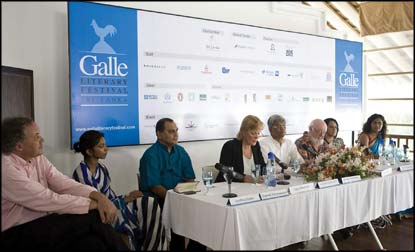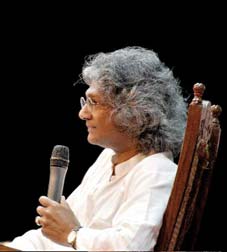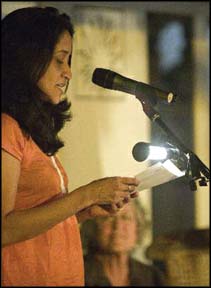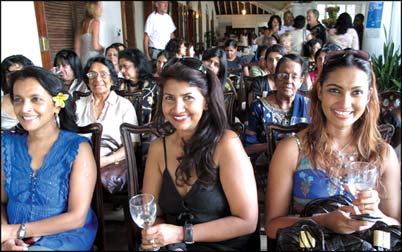|
Galle Literary Festival 2009 :
A note of hope and inspiration
by Indeewara THILAKARATHNE and Ranga CHANDRARATHNE
 The feeble rays of sun set over the enchanting port city of Galle,
overlooking the distant hills of Rumassala as the much-awaited literary
fiesta of the year the Galle Literary Festival of 2009 concluded,
leaving behind loads of memories for both the participants and the
literati. By now the festival has come of age and has set its own
character and precedence. The feeble rays of sun set over the enchanting port city of Galle,
overlooking the distant hills of Rumassala as the much-awaited literary
fiesta of the year the Galle Literary Festival of 2009 concluded,
leaving behind loads of memories for both the participants and the
literati. By now the festival has come of age and has set its own
character and precedence.
 |
|
Romesh Gunasekara
Pix-Twiggy |
Apart from literature of diverse flavours and hues, the festival has
opened avenues for Sri Lankan literature in English, drama and offered
an international podium for up-coming Sri Lankan writers in English. The
festival which opened at the Martin Wickramasinghe Museum where the
legendary Sri Lankan literary giant was born concluded with a note of
hope and inspiration. Perhaps, it was most appropriate venue for a
literary festival though the Festival was confined only to English
literature. It was at the venue four Sri Lankan up-coming authors and
poets were introduced.
Chanali Kariyawasam, Shehani Gomes, Masii and Shehan Karunatilake who
read out their works or excerpts from them offered a glimpse into
contemporary Sri Lankan literature in English. Although it has a long
way to go along the road to maturity and to be able to be truly a
people’s literature, the young writers showed that there is a growing
body of writing in English. It seemed that their writing have come under
the pervasive influence of Sri Lankan English. In a subsequent session
Michael Mayler who compiled a dictionary of Sri Lankan English pointed
out that our English has over the years acquired words and usages from
Sinhala and Tamil and has, now, been grown into distinct variety of
English. Mayler among other things stressed the importance of
recognising diverse varieties of ‘Englisheses’ grown outside main
language pool. Participants pointed out complications in testing and
evaluating the language skills of learners within a region and to set
yardstick to maintain the fundamental characteristics of the English
language so as to use it as an inter and intra national language.
 |
|
Vivimarie Vanderpoorten
pix-Alefiya Akbar Ali |
The session “Family Secrets”, conducted by M. J. Akbar, the author of
‘blood brothers’ and Ameena Hussain, the author of “The Moon in the
Water” was one of the interesting sessions where principal myths built
around Islam was shattered with sound theological basis.
Perhaps, the most exciting point that M. J. Akbar eloquently
articulated was that it was absolutely illogical to equate Islam with
fundamentalism or fascism. “Islam is a brotherhood and not nationhood.
Therefore, Call for unity is false” pointed out Akbar, emphasizing that
it was also erroneous to coin the word ‘Islamo-fascism’ as Islam is
1,400 years old whilst fascism has only commenced less than hundred
years ago. Akbar also stressed the fact that the West is metamorphosed
for glory and all that is modern while Islam is painted as
fundamentalist. He questioned the rationale behind attempts by the West
to impose their culture on devotees of Islam. For instance the headdress
worn by Muslim women is also found in the statue of Mary and woundered
whether the West would advocate the removal of the headdress from the
statues of Our Lady.
Patrick French, the official biographer of V.S Naipaul in a session
on his celebrated subject, revealed the man behind the public image of
Naipaul. It was one of the interesting sessions where a glimpse into the
private life of Naipaul was revealed. Mosses Isegawa’s session shed
light on African literature in English. Apart from reading from his own
novel Abyssinian Chronicles , Isegawa introduced up-coming African
writers in English. Romesh Gunasekara, internationally known Sri Lankan
author, recounted his experiences in exploring islands and contrary to
the popular belief, the social life in those islands are extremely
cosmopolitan and vivid.
 In a session “Love in a Time of Conflict” V. V. Ganeshanathan, the
author of Love Marriage describes how she expresses Sri Lankan
experience. The session which was moderated by Sanjana Hattotuwa, heated
up when a journalist posed the fundamental question whether the author
was a writer of fiction alone and that did she not write about the
secular contemporary political history of Sri Lanka, particularly of the
turbulent times. However, it is a pity that the moderator attempted to
equate secular history with fiction. It seems that either the
‘moderator’ does not understand the difference between history and
fiction or try to put the author onto his own track of thinking,
earnestly believing that the role of the fiction writer is confined to
interpreting distant events in history. It should be mentioned that the
moderator handled the session very badly. In a session “Love in a Time of Conflict” V. V. Ganeshanathan, the
author of Love Marriage describes how she expresses Sri Lankan
experience. The session which was moderated by Sanjana Hattotuwa, heated
up when a journalist posed the fundamental question whether the author
was a writer of fiction alone and that did she not write about the
secular contemporary political history of Sri Lanka, particularly of the
turbulent times. However, it is a pity that the moderator attempted to
equate secular history with fiction. It seems that either the
‘moderator’ does not understand the difference between history and
fiction or try to put the author onto his own track of thinking,
earnestly believing that the role of the fiction writer is confined to
interpreting distant events in history. It should be mentioned that the
moderator handled the session very badly.
Pico Lyer recounted the travelling with Tibetan spiritual leader
Dalai Lama and how Tibet has gone global since it was occupied by China.
Defining the ‘Global Soul’, Pico said President Barack Obama is a fine
example as he represents a blend of cultures and lineage across the
continents of civilizations. In a session ‘Time/Travel’, Colin Thubron
narrated the fascinating journey through the ancient Silk Road and how
it had helped cross germinate the races across the fault-lines of
civilizations.
Some of the other interesting sessions included Thomas Keneally’s
“Beyond Schindler” and the session “Stranger than Fiction”, a session on
journalism.
The session was marked by the absence of any Sri Lankan journalist
from mainstream print media. Galle Literary Festival of 2009 concluded
with renewed hopes for another exciting literary fiesta. |


